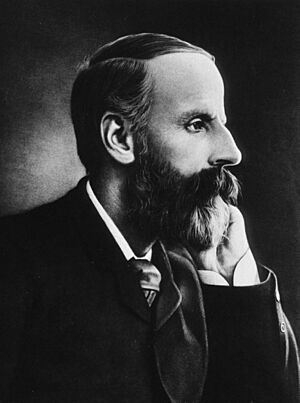James Ward (psychologist) facts for kids
Quick facts for kids
James Ward
|
|
|---|---|
 |
|
| Born | 27 January 1843 Kingston upon Hull, England
|
| Died | 4 March 1925 (aged 82) Cambridge, England
|
| Alma mater | |
| Era | Contemporary philosophy |
| Region | Western philosophy |
| School | British idealism |
| Institutions | Trinity College, Cambridge |
| Academic advisors | Hermann Lotze |
| Notable students |
|
|
Main interests
|
Philosophy of psychology |
|
Notable ideas
|
Panpsychism |
|
Influences
|
|
|
Influenced
|
|
James Ward (born January 27, 1843 – died March 4, 1925) was an English psychologist and philosopher. He studied how the mind works and thought about big questions about life. He was also part of a special group at Cambridge University called the Cambridge Apostles.
Contents
About James Ward
Early Life and Education
James Ward was born in Kingston upon Hull, England, on January 27, 1843. He was the oldest of nine children. His father was a merchant who faced financial difficulties. Because of this, James's formal schooling ended early.
He became an apprentice to an architect in Liverpool for four years. During this time, he continued to study on his own. He learned Greek and logic and also taught at a Sunday school.
In 1863, James went to Spring Hill College near Birmingham. He trained there to become a minister for the Congregationalist church. He stayed at Spring Hill until 1869, finishing his religious studies and earning a Bachelor of Arts degree from the University of London.
Studies in Germany and Cambridge
In 1869, Ward won a scholarship to study in Germany. He attended lectures in Berlin and then moved to Göttingen. There, he studied with a famous philosopher named Hermann Lotze.
When he returned to Britain, Ward became a minister at a church in Cambridge. However, his modern ideas about religion caused problems with his church members. A friend, Henry Sidgwick, encouraged him to join Cambridge University.
Ward started as a student who wasn't part of a specific college. But in 1873, he won a scholarship to Trinity College. He did very well, earning a top score in his moral sciences exams in 1874.
Career and Research
In 1875, Ward won a special fellowship at Trinity College for his paper on how the body's functions relate to the mind. Some of his work was published in the first issue of a new journal called Mind in 1876.
From 1876 to 1877, he went back to Germany to do more research. He studied how the body works at a special institute in Leipzig. Back in Cambridge, he continued his research and published two papers on physiology in 1879 and 1880.
Around 1880, Ward started to focus more on psychology, which is the study of the mind. He wrote an important article about psychology for the Encyclopædia Britannica. In this article, he disagreed with older ideas that saw the mind as just a collection of experiences. Instead, he emphasized that the mind actively pays attention to the world.
Family Life and Later Years
James Ward strongly supported education for women. He met his future wife, Mary Martin, when she attended one of his lectures. Mary was from Ireland and was a suffragist, meaning she supported women's right to vote.
They got married on July 31, 1884, and settled in Cambridge. Mary became a lecturer at Newnham College and was part of a group called the Ladies Dining Society. They had two daughters and one son.
In 1897, Ward became a professor of Mental Philosophy and Logic at Cambridge. Some of his famous students included G. E. Moore and Bertrand Russell. He also served as the president of the Aristotelian Society from 1919 to 1920.
James Ward passed away in Cambridge on March 4, 1925.
Ward's Philosophical Ideas
James Ward developed a philosophy called panpsychism. This idea suggests that everything in the universe, even things we think of as non-living, has some form of mind or consciousness. He called his view a "spiritualistic monism," meaning he believed there was one spiritual reality behind everything.
In his books, like Naturalism and Agnosticism (1899), he argued against the idea that only matter is real (materialism). He also disagreed with the idea that the mind and body are completely separate things (dualism).
Ward believed that reality is made up of many "centers of activity," which he called "psychic monads." These are like tiny, individual units of consciousness or experience that interact with each other. His ideas were similar to those of another philosopher named Gottfried Wilhelm Leibniz. Ward thought that these "monads" work together to improve themselves and the universe. Some people have described his religious views as a "personal panentheism," which means he believed God is in everything, but also more than everything.
 | Bayard Rustin |
 | Jeannette Carter |
 | Jeremiah A. Brown |

